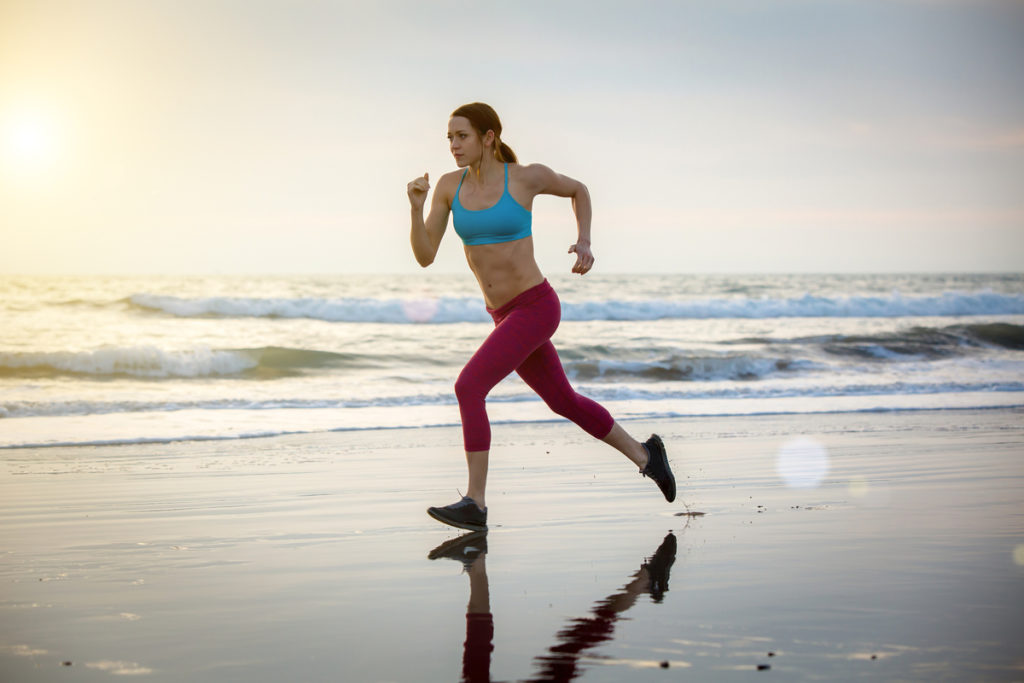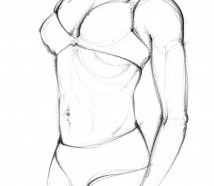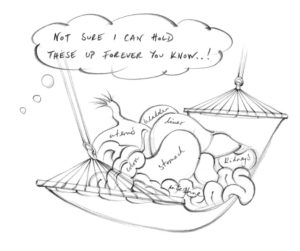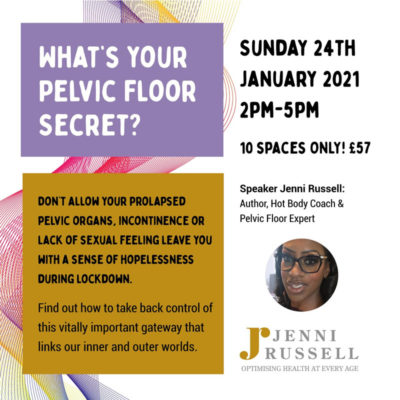BLOG
Jenni Russell’s latest news and information
How to run and not wet yourself
The one thing that life should not rob us of is our happiness. And the one way we should not lose that happiness is through an inability to stop peeing ourselves (a little or a lot) when we run, laugh or jump on the trampoline. Our body was not designed to exhibit that kind of weakness – before or after childbirth, especially since many women without children are experiencing this issue.

Incontinence is caused when the pressure within the abdominal cavity ‘bears’ down on the bladder and the pelvic floor muscles and the sphincter that loops around the urethra to control continence is no longer able to overcome it.
If you want to run and not pee yourself, laugh and not leak or enjoy the trampoline with your children then you need to do the following 7 things:
 Improve your posture. Modern living is a major cause of poor posture, from the sofas we sit in, the smartphones and computers to poor training techniques and even the shoes we wear. They all cause stresses in the upper and lower back. When the pelvis is tipped too far forward (constant wearing of high heels can do this) the lower abdominal wall becomes longer and weaker as does the anterior portion of the pelvic floor muscles right where the bladder and urethra lives. The transverse abdominal (muscles that run across the body behind the belly button), pelvic floor and multifidus (muscle in the low back) all share the same neurological loop from the brain. Their co-contraction is vital to help improve continence.
Improve your posture. Modern living is a major cause of poor posture, from the sofas we sit in, the smartphones and computers to poor training techniques and even the shoes we wear. They all cause stresses in the upper and lower back. When the pelvis is tipped too far forward (constant wearing of high heels can do this) the lower abdominal wall becomes longer and weaker as does the anterior portion of the pelvic floor muscles right where the bladder and urethra lives. The transverse abdominal (muscles that run across the body behind the belly button), pelvic floor and multifidus (muscle in the low back) all share the same neurological loop from the brain. Their co-contraction is vital to help improve continence.- Reconsider your diet. Whatever we chose to eat this is our diet – the only difference is whether that diet leads toward optimal or ill health. Many processed foods offer poor nutrition that does not help improve the body’s ability to get rid of waste. You are what you eat fact! Look at the weakness in your body and then look at the foods you eat (including its quality) and whether or not you are ‘backed up’ gassy or bloated.
 Don’t let your gut become sluggish. A compacted colon can weigh in excess of 10lbs as can a full bladder – which can weigh up to 4lbs. The pressure on the colon places adverse pressure on the pelvic floor making it weaker. Rotate your foods every four days so that you can minimise ‘backing up’ your gut.
Don’t let your gut become sluggish. A compacted colon can weigh in excess of 10lbs as can a full bladder – which can weigh up to 4lbs. The pressure on the colon places adverse pressure on the pelvic floor making it weaker. Rotate your foods every four days so that you can minimise ‘backing up’ your gut.- Don’t let your gut become too big. Whilst many joke and call it their muffin top, the lower abdomen (below the belly button) houses the most of the intestines, reproductive and eliminatory organs and kidneys. The uterus acts as a shield to protect the bladder from these organs. If the lower abdominal wall cannot support these organs properly they can descend and place more pressure on the bladder and thus the pelvic floor creating increased sustained pressure on the external sphincter (loop of muscle around the urethra to stop leaking) and cause involuntary leaks.
- Breathe well live well. The pressure that builds up in our abdominal cavity comes first and foremost from the respiratory diaphragm. This then impacts the pelvic floor. If the diaphragm is not working well, then the abdominal wall won’t and neither will the pelvic floor. It is impossible to repair anything in the body unless you address breathing first. Breathe life into your pelvic floor to optimise its ability to prevent you from embarrassing involuntary leaks.
- Avoid foods that can irritate your bladder. When the bladder is irritated it can increase the urge to urinate and a full bladder should take more than 8 seconds to empty. Try not to over urinate as this can further weaken the muscles. A point to note: cranberry juice is great for improving immune function, but, it is also an irritant if your bladder is weak, so it best avoided. Avoid also
- Spicy foods, alcohol and citrus and acidic fruits, artificial sweeteners, honey and caffeine (particularly coffee).
- Remain hydrated. The one thing that can make the issue of leaking worse is to actually reduce your water intake. Instead of drinking big amounts at once and overloading the bladder do the following:
- Take a couple of mouthfuls every 15-20 mins to stop dehydration.
- Drink room temperature water. If the water is too cold it sits in the gut until the body can raise it to room temperature.
- Get some good quality unrefined sea salt (grey) and add to your water. Salt is vital for muscle tone and strength and has amazing results for clients with weak bladder control. Read Your body’s many cries for water by F. Batmanghelidj, M.D.
- Drink a good glass of water 20 mins before eating to increase the digestive enzymes in your mouth and stomach to aid digestion, assimilation and transit. Don’t drink water whilst you eat. Wait for 1/2hr min before drinking so you do not slow down the process.




